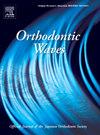INFLUENCE OF LOW-LEVEL LASER IRRADIATION ON ORTHODONTIC MOVEMENT AND PAIN LEVEL - A RANDOMIZED CLINICAL TRIAL
IF 0.5
Q4 DENTISTRY, ORAL SURGERY & MEDICINE
引用次数: 4
Abstract
ABSTRACT Introduction The aim of this study was to analyse the orthodontic tooth movement rate and pain sensitivity during maxillary and mandibular canine retraction submitted to irradiation with low-level laser therapy (LLLT) in a monthly dose. Methods Eleven Class I malocclusion patients with extraction of the first maxillary and mandibular premolars were selected. Using a split-mouth, double-blind, placebo-controlled randomized design, LLLT irradiation was applied after canine initial retraction activation, performed with NiTi coil springs. Monthly, a couple of dental casts were obtained before laser application, which was subsequently scanned with the 3Shape Ortho System. The three-dimensional images were evaluated with Ortho Analyser software to measure the amount of movement of the retracted canines. The patients also used a visual analog scale after 12, 24, 48 and 72 hours of initial activation to assess pain sensitivity. Results There was only a significantly greater amount of retraction of the irradiated mandibular canines in the first month of laser application. There was no intergroup difference in pain sensitivity. Conclusion The LLLT application protocol showed only a statistically significant acceleration of tooth movement of the mandibular canines in the first month of application but did not produce any reduction in pain sensitivity.低强度激光照射对正畸运动和疼痛程度的影响——一项随机临床试验
摘要:本研究的目的是分析每月剂量的低水平激光治疗(LLLT)照射下上颌和下颌犬齿后缩时正畸牙齿的移动速度和疼痛敏感性。方法选择11例拔除上颌第一前磨牙的ⅰ类错颌患者。采用裂口,双盲,安慰剂对照随机设计,在犬初始回缩激活后应用LLLT照射,使用镍钛线圈弹簧。每月,在激光应用前获得一对牙齿模型,随后使用3Shape Ortho系统扫描。用Ortho Analyser软件评估三维图像,以测量缩回犬的运动量。患者在初始激活12、24、48和72小时后也使用视觉模拟量表来评估疼痛敏感性。结果在激光治疗的第一个月,照射后的下颌骨内缩量明显增加。疼痛敏感性组间无差异。结论LLLT应用方案在应用的第一个月内仅能显著加速下颌犬齿的运动,但对疼痛敏感性没有任何降低。
本文章由计算机程序翻译,如有差异,请以英文原文为准。
求助全文
约1分钟内获得全文
求助全文
来源期刊

Orthodontic Waves
DENTISTRY, ORAL SURGERY & MEDICINE-
CiteScore
0.40
自引率
0.00%
发文量
0
期刊介绍:
Orthodontic Waves is the official publication of the Japanese Orthodontic Society. The aim of this journal is to foster the advancement of orthodontic research and practice. The journal seeks to publish original articles (i) definitive reports of wide interest to the orthodontic community, (ii) Case Reports and (iii) Short Communications. Research papers stand on the scientific basis of orthodontics. Clinical topics covered include all techniques and approaches to treatment planning. All submissions are subject to peer review.
 求助内容:
求助内容: 应助结果提醒方式:
应助结果提醒方式:


